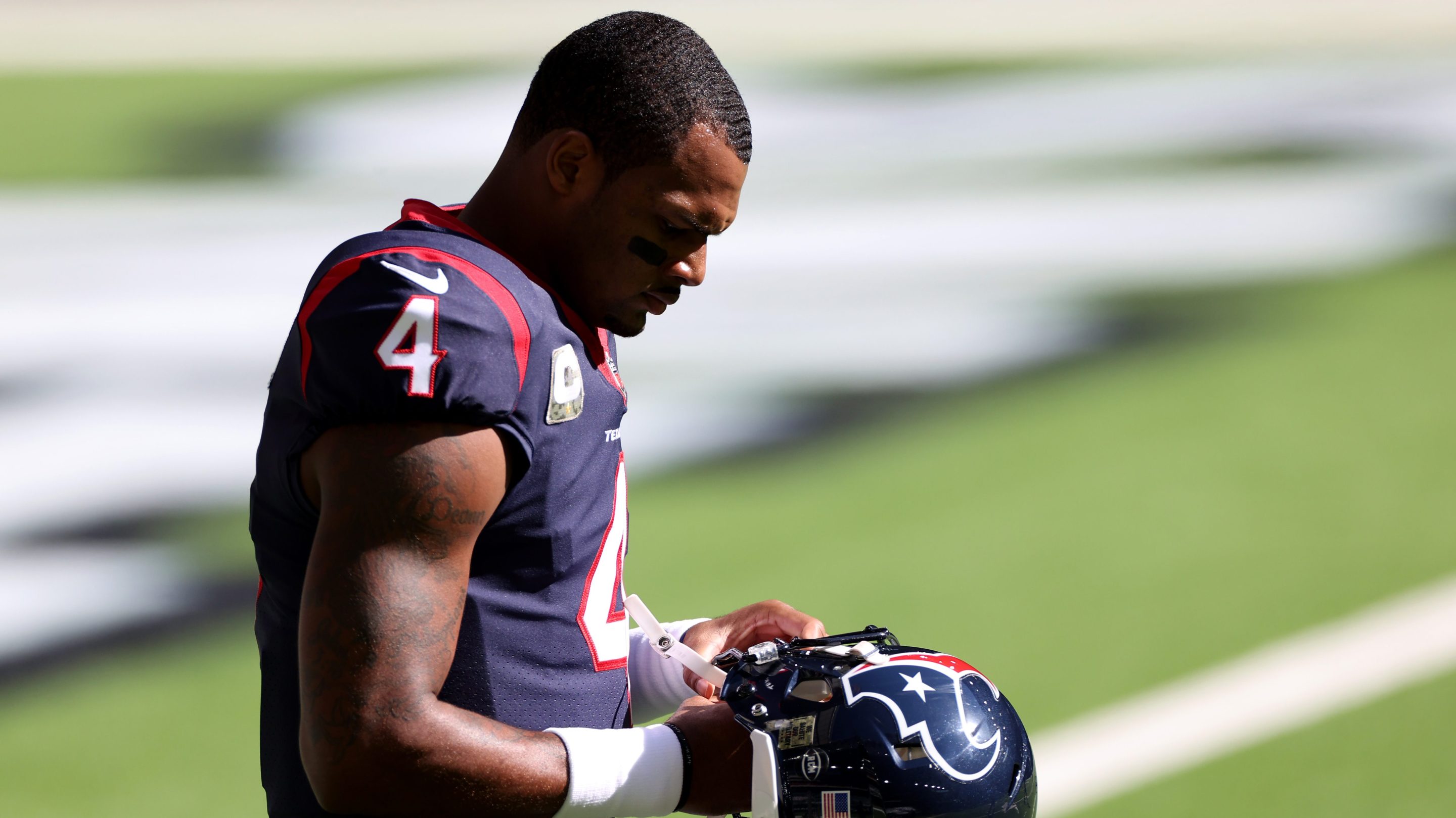It began with one civil lawsuit, filed on March 16 in Harris County District Court in Texas. The lawsuit said that quarterback Deshaun Watson—one of the best quarterbacks in the NFL, the de facto face of the Houston Texans, and a widely beloved figure recently made even more popular by his refusal to kowtow to the team's idiotic leadership—had sexually assaulted a massage therapist while she was working. Specifically, it said that Watson deliberately touched her with his penis during a private massage on March 30, 2020. Watson responded with a statement saying, "I have never treated a woman with anything other than the utmost respect" and tried to paint the woman as a gold digger. Two more lawsuits were filed the next day by two different massage therapists, and four more the day after that. Within a week, the total number of suits reached 16. As of today, the total is 22.
As with any large case, there is some variation between the narratives presented in each suit, but it's impossible to ignore the many similarities between the nearly two dozen lawsuits. In almost all of them, Watson direct messages the massage therapist on social media. Over and over again, Watson insists on being completely naked during the massage or removes his towel during the massage and won't put it back on. They all say Watson told them to work with his gluteal muscles, groins, buttocks and inner thighs, and he coaxed them to move closer to his penis and his anus. In many, the lawsuits say that Watson either tried to or did touch them with his penis while they were working. In two lawsuits, the women say Watson forced them to perform oral sex. My colleague Kalyn Kahler wrote an excellent piece detailing all these similarities when there were 16 lawsuits filed, and they have not gone away while the number of lawsuits has grown. A 23rd woman spoke to Sports Illustrated, saying Watson insisted on being completely naked during the treatment and twice began thrusting his erect penis into the air. And Houston police said they have an open investigation after receiving a complaint about Watson.
What followed next is all terribly unsurprising. Watson secured himself an excellent defense lawyer, Rusty Hardin, a name familiar enough to most sports fans. Hardin proceeded to defend his client in the media by releasing his own flurry of statements, as well as a list of women whom he said had provided massage therapy to Watson without any misbehavior by the quarterback. It should go without saying that a person can sexually assault one person and then not sexually assault another; a person's conduct with one individual does not guarantee that's how they will behave with another person. To be blunt about it: Rapists do not run around raping every person they meet all day. But this did not stop a few outlets from running the list provided by Hardin with very little context. It did not stop the Houston Chronicle from publishing the embarrassing headline "Who Is The Real Deshaun Watson?" for a story devoted to quoting people all expressing shock at the lawsuits. So, apparently, it does need saying after all. Just because a person harms another person, it does not mean that person runs around hurting all people all day.
Those wishing to downplay the lawsuits have also turned their attention to the lawyer representing the women in all the civil suits filed. Tony Buzbee posts case updates to Instagram, once put up a billboard telling the Texans to draft Johnny Manziel, and ran for Houston mayor in a campaign that included a press conference where he brought a wheelbarrow of horse manure. His demeanor isn't exactly Atticus Finch; Texas Monthly once called him a "boisterous millionaire plaintiffs’ attorney." Fair or not, there is a stereotype in our culture of the money-grubbing, truth-be-damned plaintiff's lawyer, not to be outdone by the stereotype of the truth-be-damned-if-you-can-afford-me defense lawyer, but the demeanor of a person's attorney is not a measure of the truthfulness of a person's story. This has not stopped sports reporters and commentators from talking about that anyway.
And yet, knock one smokescreen down, more will pop up. Say it's not as simple as people are all good or all bad and the response is they don't like the lawyers. Say, "Look, you don't have to like their lawyer to think something is going on when 22 different women all agree to file a lawsuit saying someone sexually assaulted them while they were working," and the response is, "But the timing is weird—surely this is all a conspiracy drummed up by the Texans to keep him!" Point out that the Texans are a laughingstock of an organization—whose main trait seems to be driving people to leave and putting a guy in charge whose résumé includes such bizarre qualifications as telling New England Patriots to not murder, so they're probably too disorganized to pull off any conspiracies—and another reason will pop up. They want money. They want revenge. They want to punish Watson for not getting with them.
It's an endless game of Whack-A-Mole that does little except illuminate what nobody wants to admit—none of us ever really know any of the athletes who take the field, no matter how many puffy profiles they sit down for, no matter how many podcasts they launch, no matter how many personal stories they publish on the Players' Tribune.
"My father, who was once a die-hard Texans fan, can now no longer mention his name without turning red, seething with disappointment," Ashley Solis, the first woman to sue Watson, said Tuesday. "I think that that's the most heartbreaking aspect of it all. We were all deceived into thinking Deshaun Watson was a good guy. And unfortunately, we know good guys can do terrible things."
But what I keep coming back to is how predictable all this is, and the bizarre amnesia that sports media continues to allow itself to enjoy. How many sports radio hosts have expressed shock at the lawsuits and proclaimed, why, gosh darn it, what's happening with Watson is complicated? It's not. This is just how our court system works. A civil suit gets filed, the person named in the lawsuit reacts with their defense. Yes, the women in the court case are asking for money, not because they are gold diggers but because America has decided that is the mechanism we use for making people whole. This is why civil court exists, why small claims court exists, why victim compensation funds exist, why buyouts exist. They are asking for money because that is what is available to them.
This is a story our culture has watched unfold before. The downfall of "America's Dad" Bill Cosby began with one woman telling the police he had drugged and raped her. The downfall of Hollywood movie producer Harvey Weinstein began with one story, published in the New York Times. The lifetime prison sentence for USA gymnastics doctor Larry Nassar can be traced back to two women, and only one, Rachael Denhollander, using her name, saying Nassar sexually abused them while pretending to provide them with medical treatment. The end of Kevin Spacey's acting career started with one man saying Spacey made sexual advances at him when he was 14, and the end of Matt Lauer's broadcasting career started with one woman filing a sexual harassment complaint with NBC. The sexual harassment scandals surrounding New York Gov. Andrew Cuomo commenced with one former staffer writing her own story about how Cuomo abused his power and sexually harassed her. This does not mean that everything said in every lawsuit filed against Watson will be upheld by a court. It does not mean Watson will meet the same fate as all the men mentioned. It does mean this pattern—one person comes forward, then another, then another—is one our country, our culture, our reporters have seen and told many times. The faux amnesia, the proclamations of shock, the confusion about what to say, are all either performance art or genuine stupidity, neither of which reflect kindly on the state of media in 2021.
(Then again, maybe a lot of people have not been paying attention. As Rose Luna, CEO of the Texas Association Against Sexual Assault, said at the same press conference where Solis spoke, "We've never had this many press at our press conference.")
This is a story about how our criminal justice system works, how our courts work, how power works. Who has the power and who doesn't. Who can rally a fleet of sports journalists to defend them, and who cannot. Who can produce a list of people to publicly defend them, and who has to stay anonymous to protect their own livelihood. Who will be derided for their choice of lawyer, and who will not. Who will get the benefit of the doubt, and who will not. I don't know what the end result of all the civil suits will be; maybe they go to trial, maybe they'll settle. I have no clue what the NFL will do and find the endless hemming and hawing about it a bizarre reflection, whether you like it or not, of our shared national values, which elevate the question of whether or not a man plays a game to the same level of importance as the question of whether he sexually assaulted someone. Nobody knows when or how or why the Watson story will end, and many commenters will reach for various phrases to describe it as the weeks, months, and possibly years go on. But I can tell you what it is not. It is not complicated.






